Father/son and Michigan/Congo partnerships create momentous opportunities for survivors of trauma through practice, research and a provocative approach

Update: On October 5, 2018, Denis Mukwege was named the winner of the Nobel Peace Prize.
As a young boy growing up in the Democratic Republic of Congo (DRC), Dr. Alain Mukwege saw the best and worst of humanity.
“When I was about nine years old I would follow my father when he was treating patients at a small, countryside hospital,” said Alain. “It was a very poor part of the country, but what struck me was the expression of gratitude when he helped people feel better. It was beyond every material thing.”
Being inspired by a parent in health care may be fairly common, but the events that unfolded in DRC during the mid-1990s are not. Now a research associate at the University of Michigan School of Nursing (UMSN), Alain’s career was shaped by extraordinary circumstances.
The war
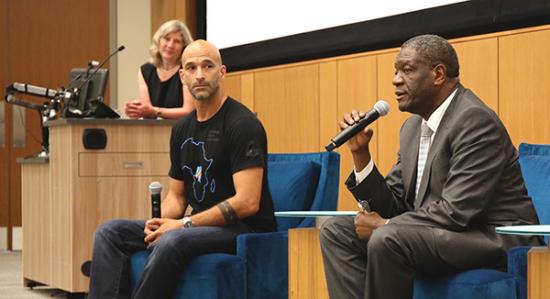 Alain Mukwege’s father, Dr. Denis Mukwege, began his career as a gynecological surgeon focused on improving maternal health. Everything changed when war broke out in DRC. Instead of expectant mothers showing up at his office, it was women who had been attacked by soldiers.
Alain Mukwege’s father, Dr. Denis Mukwege, began his career as a gynecological surgeon focused on improving maternal health. Everything changed when war broke out in DRC. Instead of expectant mothers showing up at his office, it was women who had been attacked by soldiers.
DRC’s war is complex in its origins and scope. After independence from Belgium in the 1960s, DRC had decades of relative peace, but political and socio-economic instability caused seething tension between different factions, including the government. War erupted when the ongoing conflict in neighboring Rwanda spilled across DRC’s borders.
“Everything changed after the Rwandan genocide,” said Alain Mukwege. “With the refugees came the different foreign armies. They were fighting each other on Congo’s soil.”
It didn’t take long for DRC soldiers and civilian rebel groups to start fighting the Rwandan armies and each other.
At stake is control of DRC’s extraordinary wealth of resources, including oil and gold. Just as valuable are the country’s vast reserves of minerals like cobalt, tantalum, tin and tungsten which are used in electronics such as cell phones and batteries. They are in high demand by companies around the world.
While war is known to bring pain and destruction, one element of DRC’s war is particularly brutal. Rape became a powerful weapon used to destroy and control communities. More than 20 years later, soldiers are still raping and beating women, frequently in front of their husbands, children and neighbors. In addition to their own bodies, the soldiers use foreign objects like sticks and guns.
Denis Mukwege quickly became a hero to these women by innovating new procedures to repair the physical damage of these atrocious encounters, while also ensuring the women received vital emotional and mental health support.
His work garnered worldwide attention. Denis won the United Nations Prize in Human Rights in 2008, as well as dozens of other international awards. His name is regularly mentioned in contention for the Nobel Peace Prize.
But Denis Mukwege’s advocacy has also made him a target inside his own country.
Retaliation
In 2012, armed men attacked Denis Mukwege’s home and held his daughters hostage. When he arrived, they opened fire. He was able to escape but his guard was killed and Denis was forced to flee to Europe for several months.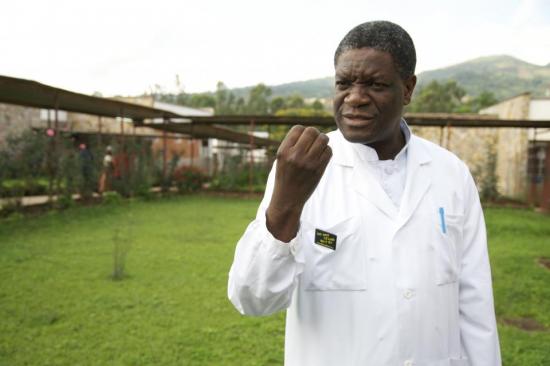
Panzi Hospital, which Denis Mukwege founded in Bukavu, DRC, is now under United Nations protection.
“Outside of the hospital, we’re not covered by anyone,” said Alain Mukwege. “There have been three instances of Panzi staff being kidnapped or shot because of their work.”
It’s a concern that Alain Mukwege thinks about regularly while in the United States with his wife and children. He often thinks about going back to DRC, but has a mission to accomplish first.
Making his own path
At a young age, Alain Mukwege knew he wanted to become a doctor. He recognized the extraordinary skills of his father and thought those techniques could benefit women around the world. He also knew DRC’s general health care system could provide better care and be more efficient.
Alain felt the best way for him to make a widespread impact was through research. After going to medical school in DRC, he came to the United States for a master’s degree in clinical research from the Mayo Clinic.
The Michigan connection
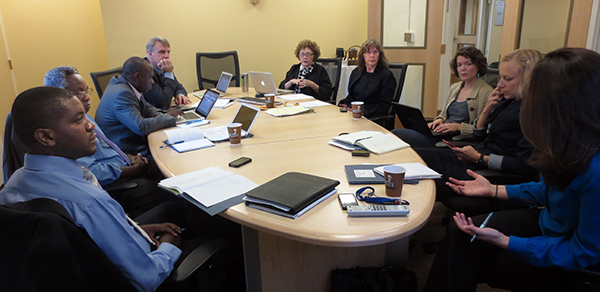 The connection to U-M began in 2010 when Denis Mukwege was awarded the university’s prestigious Wallenberg Medal. During his visit to Ann Arbor, Denis met UMSN Professor Janis Miller, Ph.D., RN, APRN, FAAN, an expert in pelvic floor disorders. They quickly formed a bond over their shared interest in helping women who suffered physical trauma from childbirth or violence.
The connection to U-M began in 2010 when Denis Mukwege was awarded the university’s prestigious Wallenberg Medal. During his visit to Ann Arbor, Denis met UMSN Professor Janis Miller, Ph.D., RN, APRN, FAAN, an expert in pelvic floor disorders. They quickly formed a bond over their shared interest in helping women who suffered physical trauma from childbirth or violence.
They co-founded the International Center for Advanced Research and Training (ICART) in DRC to address gender-based violence and clinical health issues. It’s part of the Panzi Foundation to support the work at Panzi Hospital and related efforts to help survivors.
The partnership expanded when Alain Mukwege came to U-M to work with Miller.
“The University of Michigan is a university that has an eye open to the world,” Alain Mukwege said. “People here know you can learn things from other countries, and by exchanging knowledge you can empower communities here and very far away.”
Labia elongation research
Alain Mukwege is taking the lead on a new way to help repair large fistulas (holes/tears) between the bladder and vagina. They are most frequently caused by complications in childbirth, or from rape, especially when foreign objects are used. The fistulas can cause constant urine leakage out of the vagina which makes daily life difficult and stressful for survivors.
Alain Mukwege’s work builds on one of his father’s techniques using a woman’s own labia minora to repair the fistula. Denis Mukwege’s technique has higher levels of success in reestablishing continence and lower risks of complications like rejection or infection, compared to other strategies. The key is, the woman must have enough tissue that can be safely extended to close the fistula.
In an effort to utilize local resources to address local problems, Alain Mukwege is examining the African practice of labia minora elongation, which generally begins before adolescence and continues into adulthood. Women practice elongation by regular self-pulling of the labia, often using a botanical extract as a lubricant. After a significant amount of time, the labia is enlarged.
Alain Mukwege is currently using a grant funded by the African Social Research Initiative (ASRI) to better understand the mechanisms behind the elongation. He hopes that by developing an evidence-based understanding of how long it takes for the labia to be elongated and what role the botanical plays, the practice can be used to help women who may need surgery for large fistulas.
Criticisms
However, the practice of elongation is not without critics. The World Health Organization has classified it as genital mutilation. Alain Mukwege is advocating for that to be changed.
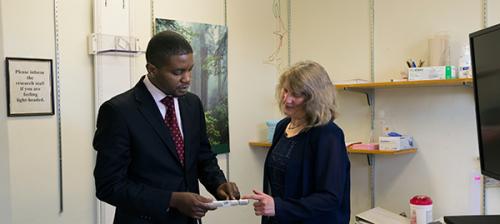 “The main thing is consent,” he says. “This is a something the woman does for her own pleasure. True genital mutilation is done in a traumatic way to deprive the women of her sexuality.”
“The main thing is consent,” he says. “This is a something the woman does for her own pleasure. True genital mutilation is done in a traumatic way to deprive the women of her sexuality.”
Alain believes the more appropriate classification is genital modification. He likens it to labiaplasty, a procedure growing in popularity in developed countries for women who want to shorten their labia, generally for comfort or cosmetic reasons.
Conversely, African women view enlargement as a positive attribute. The women also report high levels of sexual self-awareness and pleasure. That sentiment is echoed by their husbands.
Alain hopes understanding more about elongation will empower women to feel more confidence in their bodies, whatever their labia looks like. He feels strongly that the women’s motivation and the results of the practice deserve to be considered.
“If we find the practice is harmful, we can educate women on why they shouldn’t do it,” he explained. “But, our early work shows most of the women are very happy with the results and they talked about it openly. It’s negatively perceived in Western communities but when you talk to the African ladies, most of them feel very proud. Their feelings and culture should be respected.”
Next steps and returning to DRC
While continuing his research at UMSN, Alain Mukwege envisions that his next steps will include a four-year residency in Obstetrics and Gynecology. Then, when completed, he and his family plan to return to DRC. He knows it’s impossible to predict the state of his country when they return.
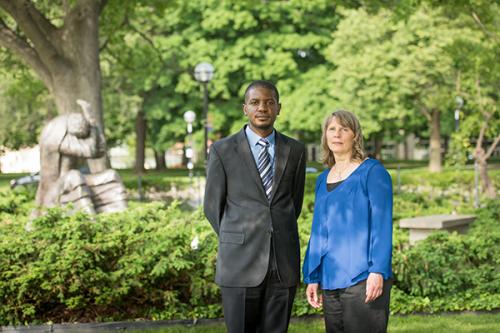 “A lot depends on our next election,” said Alain Mukwege. “We haven’t had a peaceful transition since our independence. The current president will not let that happen because he has too much interest in maintaining the status quo. That’s why my father is really outspoken about having the citizens express what they want. If they don’t, things won’t change. It means a small few will control the resources and the future of the country.”
“A lot depends on our next election,” said Alain Mukwege. “We haven’t had a peaceful transition since our independence. The current president will not let that happen because he has too much interest in maintaining the status quo. That’s why my father is really outspoken about having the citizens express what they want. If they don’t, things won’t change. It means a small few will control the resources and the future of the country.”
He knows his family takes a risk every time one of them voices their opinions.
“People in Congo are afraid to speak up because if the government can’t shut down the person, then they attempt to take his life,” he said. “In the U.S., you may not agree with everything that happens but you can have a debate. We can’t do that in Congo.”
Alain Mukwege also credits his American experience for expanding his plans.
“I know how fortunate I am that I have seen how a real democracy functions,” he said. “I want to gather all the teachings and bring them home to improve the quality of life for my people. That would be the greatest thing for me.”
As for comparisons to his father’s mighty reputation, he says the only pressure he feels comes from within.
“He has done so much and I want to contribute just as much,” he says. “That’s the pressure that I feel. My dream is to continue his mission and vision. We need to empower women, because if you empower women you’re able to empower the entire community and future generations.”





